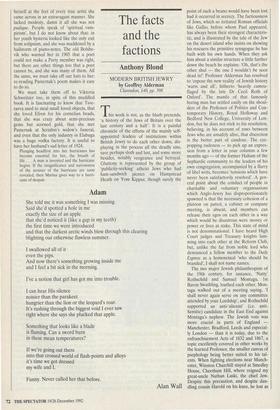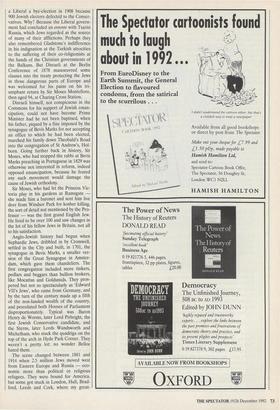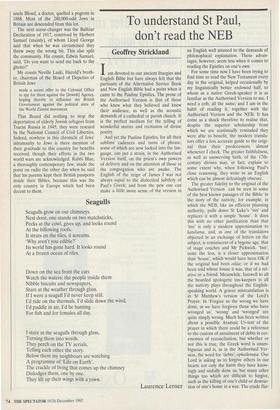The facts and the factions
Anthony Blond
MODERN BRITISH JEWRY by Geoffrey Alderman Clarendon, £410, pp. 398 his work is not, as the blurb pretends, 'a history of the Jews of Britain over the last century and a half'. It is a painful chronicle of the efforts of the mainly self- appointed leaders of institutions within British Jewry to do each other down, dis- playing in the process all the deadly sins, save perhaps sloth and lust, and some more besides, notably vengeance and betrayal. Gluttony is represented by the group of 'publicity-seeking' atheist Jews who had ham-sandwich picnics on Hampstead Heath on Yom Kippur, though surely the point of such a beano would have been lost had it occurred in secrecy. The factiousness of Jews, which so irritated Roman officials like Gallio, before whom Paul appeared, has always been their strongest characteris- tic, and is illustrated by the tale of the Jew on the desert island who insists on showing his rescuers the primitive synagogue he has built with his own hands. When they ask him about a similar structure a little further down the beach he explains: 'Oh, that's the other shul — the one I wouldn't be seen dead in!' Professor Alderman has resolved to 'expose the new reality' of Jewish history 'warts and all', hitherto 'heavily camou- flaged by the late Dr Cecil Roth of Oxford'. The mantle of that famously boring man has settled easily on the shoul- ders of the Professor of Politics and Con- temporary History, Royal Holloway and Bedford New College, University of Lon- don, but he does not stick to his resolution, believing, in his account of rows between Jews who are unsafely alive, that discretion is the better part of candour. The eye- popping rudeness — to pick up an expres- sion from a letter in your columns a few months ago — of the former Haham of the Sephardic community to the leaders of his own congregation, accompanied by a flurry of libel writs, becomes 'tensions which have never been satisfactorily resolved'. A gen- eral point about the conduct of people in charitable and voluntary organisations which Anglo-Jewry has disproportionately spawned is that the necessary cohesion of a platoon on patrol, a cabinet or company meeting, is absent, and members can release their egos on each other in a way which would be disastrous were money or power or lives at stake. This state of mind is not denominational. I have heard High Court judges and Treasury knights lam- ming into each other at the Reform Club, but, unlike the far from noble lord who denounced a fellow member to the Daily Express as a homosexual 'who should be branded', I shall not name names.
The two major Jewish philanthropists of the 19th century, for instance, 'Natty' Rothschild and Samuel Montagu, 1st Baron Swathling, loathed each other. Mon- tagu walked out of a meeting saying, 'I shall never again serve on any committee attended by your Lordship', and Rothschild supported an anti-'alienist' (i.e. anti- Semitic) candidate in the East End against Montagu's nephew. The Jewish vote was more crucial in parts of England — Manchester, Bradford, Leeds and especial- ly London — than it is today, due to the enfranchisement Acts of 1832 and 1867, a topic excellently covered in other works by the learned Professor, the smaller canvas of psephology being better suited to his tal- ents. When fighting elections near Manch- ester, Winston Churchill stayed at Smedley House, Cheetham Hill, where reigned my great-uncle Nathan Laski, the chief Jew. Despite this precaution, and despite dan- dling cousin Harold on his knee, he lost as a Liberal a bye-election in 1908 because 900 Jewish electors defected to the Conser- vatives. Why? Because the Liberal govern- ment had concluded an entente with Tsarist Russia, which Jews regarded as the source of many of their afflictions. Perhaps they also remembered Gladstone's indifference in his indignation at the Turkish atrocities to the suffering of their co-religionists at the hands of the Christian governments of the Balkans. But Disraeli at the Berlin Conference of 1878 manoeuvred some clauses into the treaty protecting the Jews in those dangerous parts of Europe and was welcomed for his pains on his tri- umphant return by Sir Moses Montefiore, then aged 94, at Charing Cross Station.
Disraeli himself, not conspicuous in the Commons for his support of Jewish eman- cipation, could not have become Prime Minister had he not been baptised, when his father, piqued by a fine imposed by the synagogue of Bevis Marks for not accepting an office to which he had been elected, marched his family down Theobald's Road into the congregation of St Andrew's, Hol- born. Going further back in history, Sir Moses, who had stopped the rabbi at Bevis Marks preaching in Portuguese in 1829 was otherwise not interested in reform, indeed opposed emancipation, because he feared any such movement would damage the cause of Jewish orthodoxy.
Sir Moses, who had let the Princess Vic- toria play in his gardens at Ramsgate — she made him a baronet and sent him live deer from Windsor Park for kosher killing, the sort of detail not mentioned by the Pro- fessor — was the first grand English Jew. He lived to be over 100 and saw changes in the lot of his fellow Jews in Britain, not all to his satisfaction.
Anglo-Jewish history had begun when Sephardic Jews, dribbled in by Cromwell, settled in the City and built, in 1701, the synagogue in Bevis Marks, a smaller ver- sion of the Great Synagogue in Amster- dam, which gave them chandeliers. The first congregation included more tinkers, pedlars and beggars than bullion brokers, like Mocattas and Goldsmids. They pros- pered but not so spectacularly as 'Edward VII's Jews', who came from Germany, and by the turn of the century made up a fifth of the non-landed wealth of the country, and percolated both Houses of Parliament disproportionately. Typical was Baron Henry de Worms, later Lord Pirbright, the first Jewish Conservative candidate, and the Sterns, later Lords Wandsworth and Michelham, who stuck the quadriga on the top of the arch in Hyde Park Corner. They weren't a pretty lot: no wonder Belloc hated them.
The scene changed between 1881 and 1914 when 2.5 million Jews moved west from Eastern Europe and Russia — eco- nomic more than political or religious refugees. They were bound for America, but some got stuck in London, Hull, Brad- ford, Leeds and Cork, where my great- uncle Blond, a doctor, quelled a pogrom in 1888. Most of the 280,000-odd Jews in Britain are descended from this lot.
The next scene-changer was the Balfour Declaration of 1917, contrived by Herbert Samuel (mainly), of whom Lloyd George said that when he was circumcised they threw away the wrong bit. This also split the community. His cousin, Edwin Samuel, said, 'Do you want to send me back to the ghetto?'
My cousin Neville Laski, Harold's broth- er, chairman of the Board of Deputies of British Jews
made a secret offer to the Colonial Office to spy for them against the [Jewish] Agency, hoping thereby to influence the British Government against the political aims of the World Zionist movement.
That Board did nothing to stop the deportation of elderly Jewish refugees from Tsarist Russia in 1945; they were rescued by the National Council of Civil Liberties. Indeed, nowhere in this chronicle of Jews' inhumanity to Jews is there mention of their gratitude to this country for benefits received, though their efforts in the two world wars are acknowledged. Rabbi Blue, a thoroughly contemporary Jew, made the point on radio the other day when he said that his parents kept their British passports inside their Bibles, because this was the only country in Europe which had been decent to them.












































































































 Previous page
Previous page